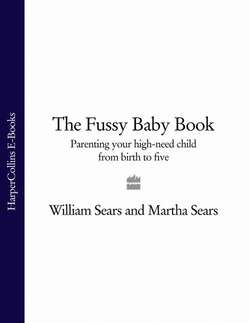Читать книгу The Fussy Baby Book: Parenting your high-need child from birth to five - Martha Sears - Страница 50
better early than late
ОглавлениеNeeds that are met early in life go away. Needs that are left unmet never entirely disappear. Instead, the child can follow one of several paths. He can go through life with lower expectations and resign himself to an unfulfilled life. He can spend his life coping on his own and never learn to use the resources of others. Or, he can live a life of anger that the responses he expected were not the responses he got. He will always be searching without really knowing what he is searching for. It’s a case of “parent me now” or “parent me later”. Therapists’ offices are filled with high-need adults in search of re-parenting.
It helps to see separation from the baby’s viewpoint. To most adults, especially those of the “babies must learn to be independent” mind-set, baby and mother should be separate people, able to function on their own. Babies don’t see it that way. In their minds, mother is a part of them, and they are part of mother. Mother and baby are one, a complete package. These babies feel right when they feel at one with mother; they feel anxious and frightened when not with mother. Adults dub this completely normal behaviour “separation anxiety”. In reality, these emotions are normal feelings inside a little person who knows that he needs the presence of his mother to thrive and to feel complete. Labels such as “stranger anxiety” or “separation anxiety” are adult jargon, reflecting our expectations of how we want babies to act for our own convenience, not how babies really are, or what they really need.
We have observed that mothers who spend the early months practising what we call attachment parenting (wearing their baby many hours a day in a sling, breast-feeding on cue, taking their babies with them wherever they go, and often sleeping with baby) themselves experience separation anxiety when not with their baby. If this anxiety appears in normal mothers, shouldn’t it also be normal in babies? Fortunately, high-need babies have powerful personalities to tell us when things are not right.
Your baby’s quality of being very selective about who cares for her shows that she is highly discerning. High-need babies know which situations and which people they can trust to meet their needs, and they protest if these expectations are not met. Loud separation protests also reveal that these babies have a capacity for forming deep attachments – if they didn’t care deeply, they wouldn’t fuss so loudly when separated. This capacity is the forerunner of intimacy in adult relationships.
Eventually, the infant’s care-giving circle will grow to include people other than mother. The concept of weaning can be applied to more areas than just the breast or bottle. It also means letting go of exclusive relationships. When a new baby comes along, for example, the older one by necessity must begin to wean from mother to father (if she hasn’t started already). Our own high-need babies were willing to stay happily with people other than Martha by age three and a half, and sooner than that if that person was someone to whom they were already strongly attached (father, sibling, close friend of mother’s, grandparent). Our youngest daughter, Lauren, was given a videotape when she was about two years and nine months old that included a song entitled “Mama Comes Back.” It was her favourite part of the video. She liked Martha to sing the song for her at bedtime over and over. We were still having trouble leaving her happily behind when we went out, and one night we again faced a tearful Lauren who didn’t want Martha to leave. Remembering how much Lauren liked this song, Martha suggested that because she was leaving, she’d put on “Mama Comes Back” for her. Her face instantly brightened and she clicked on to that idea and ran happily to watch the video, secure in the reassurance that Mummy would come back.
